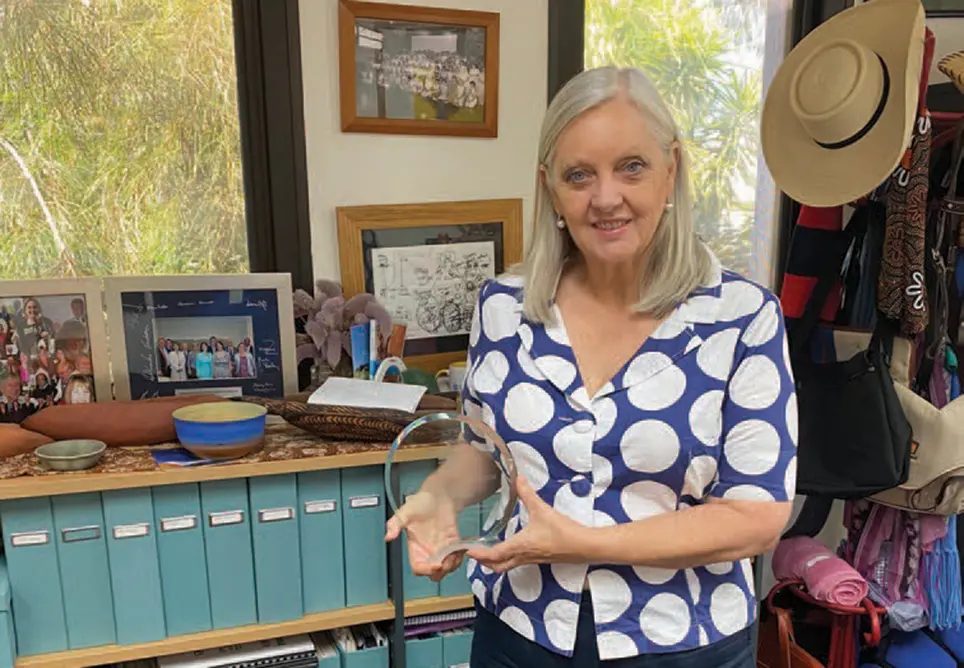
Professor Sabina Knight, Director of the Centre for Rural and Remote Health at James Cook University, based in Mount Isa, is the 2020 recipient of the prestigious Aurora Award, which each year recognises an individual who has made an outstanding contribution to remote health.
Sabina, who identifies first and foremost as a remote area nurse and health advocate, has been contributing to CRANA since its inception in 1983, through its growth into CRANAplus in 2008, up to the present day.
“It is the greatest honour to be recognised by your peers,” says Sabina.
It was in 1983 that 130 remote area nurses from around Australia came together in Alice Springs to put remote health issues on the national health agenda. Sabina was the first CRANA Vice President, has held the position of President several times over the years, and has held a variety of other elected roles.

This year, one contribution unique in Aurora Award history has been her appointment as the CRANAplus representative on the National COVID-19 Clinical Evidence Taskforce. 2020 has also been the year when a campaign she initiated in 2012 for safety standards for quad bike safety has finally reaped rewards, with new federal government standards requiring all quad bikes be fitted with crush protection devices at the point of sale coming into force next year.
Sabina recalls the early days of CRANA when “we lobbied hard and strong to improve remote health and to improve the capability of the RAN workforce. She successfully secured grants for the REC course, for the Bush Crisis Line (now CRANAplus Bush Support Services), the Post Graduate Remote Health Practice Program
and to develop a clinical procedure manual.
“We were ahead of our time, working in collaboration with other organisations. Now that is expected.”
“We worked initially with the College of Surgeons and the then fledgling College of Emergency Physicians as well as ACRRM to develop REC. Today’s connections include the Centre for Remote Health, Flinders University in Alice Springs and the Centre for Rural and Remote Health, James Cook University in Mount Isa.”

Over her career, Sabina has embraced the role of mentor within and external to the organisation.
“I love supporting from behind. It is just fabulously exciting to watch people grow
into the roles and into leaders and people of influence. We need bright, young committed people to take the organisation forward to continue improving health outcomes – after all that is why we exist – to make a difference.
“We will always be advocates for our communities, families and clients,” says Sabina, who points out that the founding CRANA philosophy is as strong as ever, acknowledging the impact of history, underpinned with respect for every individual.
“The importance of providing high-quality care goes beyond technical skills. Remote health workers need to be well-educated, calm and collegial, resilient, willing to go the extra mile.”
“Team work is an important element of remote health care – even for sole practitioners.”
“They need to know when and where to get help – either virtually or from someone in
the community or right beside you – and to recognise the importance and value of working well with different disciplines, showing respect and taking care for each other.”
Coming from a rural background, Sabina always knew she wanted to work outside the cities. She turned to Aboriginal health within the first year of nursing.
She now works hard to make sure young people from rural and remote towns and communities know that a nursing or health career is an option for them and that there are pathways to get there.
“When rural kids take up a career in health, I believe it’s a good idea to go to a regional university in the area where they are going to practice. This provides students with the skills, not just to work in rural and remote areas, but also to live and thrive in them.
“We need to make nursing education accessible where people live and where
they want to work. Rural kids are the entrepreneurs of the future, we must make sure they get a chance to get the skills and qualifications to take it on.
“The best and the worst of working in remote areas do, in fact mirror each other – clinical variety, dealing with uncertainty, looking after people in the context of their family and place and facing challenging situations,” she says.
“You can find yourself teetering on the edge of clinical practice. But we love it – having to have clinical courage. And now we have access to so much knowledge and resources to support us.”
“We also love the connection with community and country and we know that it is a privilege to be working within this place, with these people – wherever we are. What we do can and does make a difference – and we know we must strive to get it right.”
